What is a Support Ticketing System: Everything You Need to Know
A support ticketing system is a software application that helps businesses track, manage, and resolve customer inquiries efficiently. These systems convert customer requests from multiple channels, email, chat, phone, and social media—into organized tickets, ensuring no customer inquiry falls through the cracks.
With the right ticketing system, businesses can reduce response times by up to 42% and increase customer satisfaction by 35%.
Based on our experience helping over 10,000+ businesses implement support solutions, the right ticketing system transforms chaotic customer service into a streamlined, data-driven operation that delights customers and empowers support teams.
Whether you’re looking to create a support ticketing system from scratch or upgrade your existing solution, understanding the core capabilities and benefits is essential.
What is a Support Ticketing System?

A support ticketing system is a centralized platform that converts customer inquiries, complaints, and requests into trackable “tickets.”
Each ticket contains essential information, including customer details, issue description, priority level, and resolution status. This organization ensures every customer concern receives appropriate attention and timely resolution.
Modern ticketing systems serve as the command center for customer service operations. They automate ticket routing, track response times, measure team performance, and provide valuable insights into customer pain points.
For businesses managing more than 50 customer inquiries daily, a ticketing system becomes essential infrastructure rather than optional software.

How Support Ticketing Systems Work
When a customer reaches out through any channel, the system automatically:
- Creates a unique ticket with a tracking number and timestamp.
- Categorizes the inquiry based on keywords, department, or issue type.
- Assigns priority levels (urgent, high, medium, low) based on predefined rules.
- Routes to the appropriate agent or department with relevant expertise.
- Tracks all communications between the customer and support team in one thread.
- Monitors resolution time and sends notifications to prevent SLA breaches.
- Closes the ticket once the issue is resolved and the customer confirms satisfaction.
This systematic approach eliminates the chaos of scattered emails, lost messages, and duplicated efforts that plague businesses without a proper ticketing infrastructure.
Key Benefits of Customer Support Ticket Systems
Support ticketing systems deliver measurable improvements across customer experience, team productivity, and business outcomes. Based on industry research and our direct experience implementing these systems, here are the most significant benefits:
Deliver Comprehensive Customer Service at Scale

Support ticketing systems centralize all customer communications regardless of channel. Whether customers contact you via email, live chat, social media, or phone, every interaction creates a unified ticket with complete conversation history.
The integration of artificial intelligence has revolutionized modern ticketing systems. AI-powered features now handle routine queries automatically—password resets, order status checks, and FAQ responses—freeing your team to focus on complex issues requiring human expertise and empathy.
Businesses implementing AI in their ticketing systems report 25-40% reduction in agent workload and 50% faster response times for common inquiries.
Machine learning algorithms also analyze ticket patterns to suggest relevant knowledge base articles, predict ticket categories, and even recommend solutions based on historical resolutions, dramatically improving first-contact resolution rates.
Resolve Customer Issues Swiftly and Efficiently
Time is the currency of customer satisfaction. Every minute a customer waits for resolution erodes trust and increases churn risk. Research shows that 60% of customers expect responses within one hour, and 89% will switch to competitors after poor customer service experiences.
Without a ticketing system, agents waste valuable minutes searching through email chains, asking customers to repeat information, or tracking down who last handled an issue. Support ticketing systems eliminate these inefficiencies by providing instant access to complete ticket histories, customer profiles, past interactions, and relevant documentation.
Automated workflows further accelerate resolution by triggering actions based on ticket properties. High-priority tickets from VIP customers can automatically escalate to senior agents, while routine requests follow predefined resolution paths. This intelligent automation ensures consistent service quality while reducing average resolution time by 30-50%.
Understanding how bad customer service affects your business makes the value of efficient ticketing systems even clearer—every delayed response represents potential revenue loss and reputation damage.
Prevent Customer Inquiries from Falling Through the Cracks
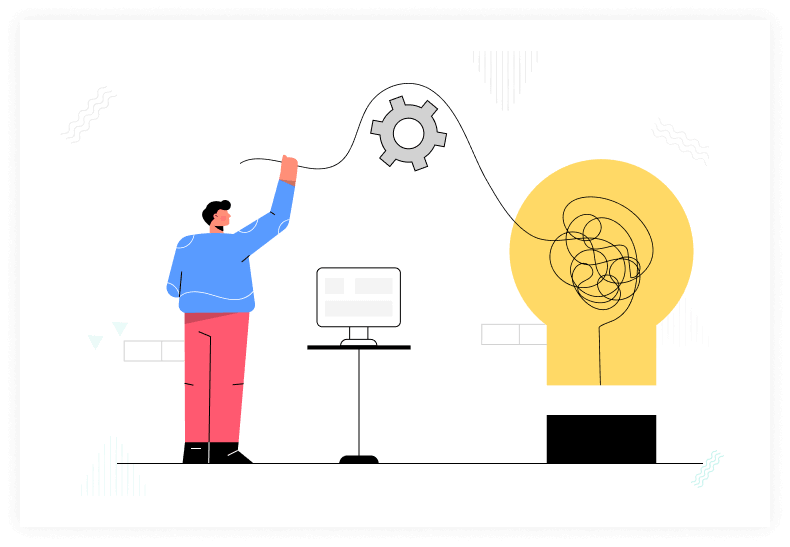
The greatest risk in customer support isn’t slow responses—it’s no response at all. Unanswered inquiries represent failed customers who will almost certainly never return and may damage your reputation through negative reviews.
Support ticketing systems provide foolproof accountability through comprehensive case management. Agents and managers can instantly see ticket status across all stages: new, awaiting response, in progress, pending customer reply, escalated, or closed.
Built-in SLA monitoring alerts agents when tickets approach deadline thresholds, ensuring proactive rather than reactive support. Dashboard views show queue depth, aging tickets, and agent workload distribution, enabling managers to redistribute work and prevent bottlenecks before they impact customers.
The system creates an audit trail for every ticket—who touched it, what actions they took, and when, establishing clear responsibility and enabling continuous process improvement through data analysis. This systematic approach is central to any effective customer service strategy.
Improve Team Collaboration and Knowledge Sharing
Modern support challenges often require expertise from multiple departments, technical teams, billing specialists, product experts, and account managers. Ticketing systems facilitate seamless collaboration through internal notes, ticket transfers, and @mention notifications that keep all stakeholders informed without cluttering customer-facing communications.
Knowledge base integration transforms every resolved ticket into institutional knowledge. Agents can document solutions and create help articles directly from tickets, building a searchable repository that reduces future ticket volume by empowering customer self-service. Learning how to handle customer complaints effectively becomes easier when teams can reference past resolutions and proven approaches.
Gain Actionable Insights Through Data and Reporting
Every ticket generates valuable data about customer needs, product issues, and support performance. Ticketing systems transform this data into actionable intelligence through comprehensive reporting and analytics.
Track metrics including:
- Average first response time and resolution time
- Customer satisfaction scores and Net Promoter Score (NPS)
- Ticket volume by category, revealing product pain points
- Agent performance and productivity metrics
- Peak support hours and seasonal trends
- Self-service success rates and knowledge base effectiveness
These insights enable data-driven decisions about staffing, training priorities, product improvements, and customer experience investments. Aligning these metrics with your customer satisfaction objectives ensures continuous improvement.
Support Genix
WordPress Support Ticket Plugin
Take Your Customer Support to The Next Level and Boost Customer Satisfaction Rates
Essential Features Required in Modern Ticketing Systems
Not all ticketing systems deliver equal value. When evaluating solutions for your business, prioritize these essential features that separate basic tools from comprehensive platforms:
Multi-Channel Ticket Creation (Omnichannel Support)
Customers expect to reach you on their preferred channels, email, live chat, phone, social media, web forms, and mobile apps. Your ticketing system should automatically convert inquiries from all channels into unified tickets, ensuring consistent handling regardless of contact method.
Look for: Native integrations with major platforms (Facebook, Twitter, Instagram, WhatsApp), email-to-ticket conversion, embeddable web widgets, and API access for custom integrations.
Transfer Ticket

Support ticketing systems are designed to give businesses and organizations a way to keep track of customer inquiries and issues. In most cases, tickets can be transferred from one agent or department to another. This feature can be helpful if the original agent is not able to resolve the issue or if the issue needs to be escalated to a higher level of support.
Intelligent Ticket Routing and Assignment
Manual ticket assignment creates delays and uneven workloads. Advanced routing automatically distributes tickets based on agent availability, expertise, workload, language capabilities, and customer properties (VIP status, subscription level, geography).
Look for: Round-robin distribution, skill-based routing, load balancing, automatic escalation rules, and business hours awareness.
Email Piping and Two-Way Email Integration
Email remains the dominant support channel for many businesses. Email piping automatically imports customer emails as tickets while maintaining email threading. Agents reply through the ticketing system, and responses appear in customers inboxes as regular emails, creating seamless experiences.
Look for: Two-way email sync, CC/BCC support, email template libraries, and the ability to handle attachments and formatting. Check out our email-to-ticket setup guide for implementation details.
Ticket Transfer and Escalation Capabilities
Complex issues often require expertise from multiple agents or departments. Ticketing systems should enable smooth transfers with context preservation—all previous communications and notes transfer with the ticket, preventing customers from repeating information.
Look for: One-click transfers between agents/departments, escalation workflows, temporary ticket assignment for consultation, and full conversation history visibility.
Automated Ticket Workflows and Triggers
Automation eliminates repetitive manual work, ensuring consistency and freeing agents for high-value activities. Define rules that automatically categorize tickets, set priorities, assign agents, send responses, request additional information, or close resolved tickets.
Look for: If/then rule builders, time-based triggers, multi-condition logic, action chaining, and pre-built workflow templates.
Comprehensive Email Notifications and Alerts

Stakeholders need timely updates without constantly monitoring the ticketing system. Configurable notifications alert agents about new assignments, customer replies, approaching SLAs, and escalations while keeping customers informed about ticket status.
Look for: Customizable notification triggers, role-based notification rules, digest options to reduce email volume, and SMS/push notification capabilities.
Create Tickets on Behalf of Customers
Phone and in-person support require agents to create tickets representing customer interactions. This feature ensures all support activities are tracked and measured consistently, regardless of initial contact method.
Look for: Quick-create forms, customer search/auto-complete, ability to set ticket properties during creation, and integration with phone systems for automatic ticket creation during calls.
Internal Notes and Private Comments
Teams need to collaborate on complex issues without exposing internal discussions to customers. Private notes enable agents to consult colleagues, document troubleshooting steps, and share context without cluttering customer-visible communications. Learning tips for writing effective support ticket replies helps agents craft both public responses and internal notes effectively.
Look for: Clear visual distinction between public replies and private notes, @mentions to notify specific team members, and note visibility controls.
Knowledge Base Integration
Self-service reduces ticket volume while empowering customers to resolve issues immediately. Integrated knowledge bases let agents quickly reference articles, share helpful content with customers, and create new articles from resolved tickets.
Look for: In-app article search, one-click article sharing, customer-facing help center, article performance analytics, and workflows that suggest relevant articles based on ticket content.
Agent Performance Management and Controls
Managers need visibility into individual and team performance to identify coaching opportunities and capacity planning needs. Comprehensive agent management includes performance dashboards, permission controls, and workload monitoring.
Look for: Agent-level reporting, role-based permissions, working hours configuration, out-of-office settings, and productivity metrics (tickets resolved, response times, satisfaction scores). Support agents also benefit from resources on how to improve customer service skills.
Custom Fields and Ticket Properties
Every business has unique support needs requiring custom data collection. Custom fields let you capture specific information—product versions, subscription IDs, order numbers, urgency reasons—enabling better routing, reporting, and context.
Look for: Multiple field types (text, dropdown, checkbox, date), conditional field display, required field enforcement, and field-based automation rules.
SLA Management and Monitoring
Service Level Agreements define response and resolution time commitments. SLA management tools track performance against these commitments, escalate at-risk tickets, and provide compliance reporting. Understanding the benefits of having a service level agreement helps you implement effective SLA policies.
Look for: Multiple SLA policies for different customer segments, business hours awareness, automatic escalation, SLA performance dashboards, and breach alerts.
Reporting and Analytics
Data-driven support requires robust reporting. Beyond basic metrics, advanced analytics reveal trends, predict future ticket volumes, identify knowledge gaps, and measure the business impact of support operations.
Look for: Pre-built report templates, custom report builders, data visualization, scheduled report delivery, export capabilities, and integration with business intelligence tools.
Mobile Access and Apps
Support teams increasingly work remotely or handle urgent issues outside office hours. Mobile apps ensure agents can respond to critical tickets from anywhere while maintaining full access to ticket history and knowledge resources. For distributed teams, understanding what is remote customer service provides valuable context.
Look for: Native iOS and Android apps, mobile-optimized web interface, push notifications, and core features available offline.
Recommended Blogs for You:
👉 How to Use WordPress Support Ticket Plugin in 5 Easy Steps
👉 How to Fix Bad Customer Service: Tips and Tricks
👉 How to Create a Support Ticket System for WooCommerce
👉 Importance of Customer Service in eCommerce Business
Top 10 Support Ticketing Systems in 2025
Selecting the right ticketing system depends on your business size, budget, technical requirements, and support complexity. Here’s our comprehensive analysis of the leading solutions in 2025:
Support Genix
Best for: WordPress-based businesses and WooCommerce stores
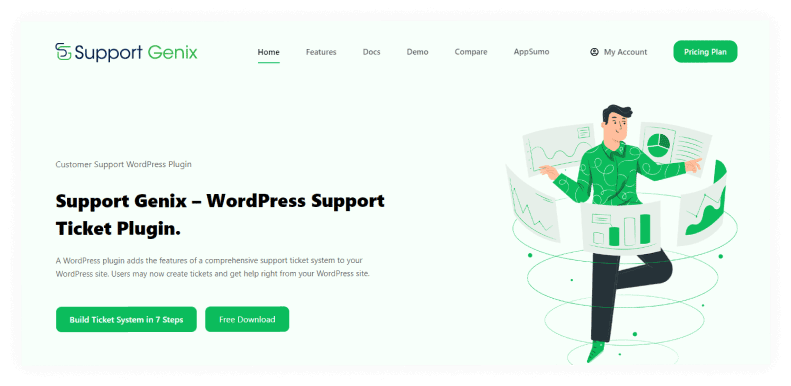
Support Genix delivers a complete ticketing solution specifically designed for the WordPress ecosystem. As a native WordPress plugin, it integrates seamlessly with existing WordPress sites, requiring no complex setup or external services.
The system handles unlimited tickets, agents, and customers without throttling or overage charges. Email piping automatically converts customer emails into tickets, while webhook support enables custom integrations with CRM systems, payment platforms, and marketing tools.
What sets Support Genix apart is its focus on WordPress and WooCommerce integration with cutting-edge AI capabilities. The system automatically pulls order data, customer information, and purchase history into tickets, giving agents complete context for commerce-related support issues.
For e-commerce businesses, learning how to create a support ticket system for WooCommerce is simplified with Support Genix’s native integration.
Agents can create tickets on behalf of customers during phone calls or live chat sessions, ensuring comprehensive support tracking.
The Elite Licenser integration provides seamless license management for digital product sellers, automatically validating customer licenses and subscription status during support interactions.
Key Features
- Unlimited tickets, agents, and customers across all plans
- Native WordPress and WooCommerce integration
- NEW: AI Writing Assistant – “Help Me Write” reduces response time by 60%
- NEW: 24/7 AI-Powered Chatbot – Reduces ticket volume by 40%
- NEW: Knowledge Base Builder – AI-powered documentation system
- NEW: Smart Analytics – Performance insights and reporting dashboard
- Email piping and automatic email-to-ticket conversion
- Create tickets on behalf of users with full customer context
- Elite Licenser integration for license validation
- Webhook support for custom integrations
- Advanced integrations (WhatsApp, Slack, FluentCRM, Tutor LMS, BetterDocs)
- GDPR compliance features
- Mobile-responsive interface
Pricing- Support Genix offers cost-effective and simple services for small and medium enterprises.
- Yearly Plans: Personal $59 (1 site) | Developer $99 (5 sites) | Agency $149 (100 sites)
- Lifetime Plans: Personal $149 (1 site) | Developer $399 (5 sites) | Agency $699 (100 sites)
Ideal for: Small to medium businesses using WordPress, WooCommerce store owners, digital product sellers, and agencies managing multiple client sites. Check out our installation guide to get started.
HappyFox
Best for: Mid-sized businesses requiring robust automation.
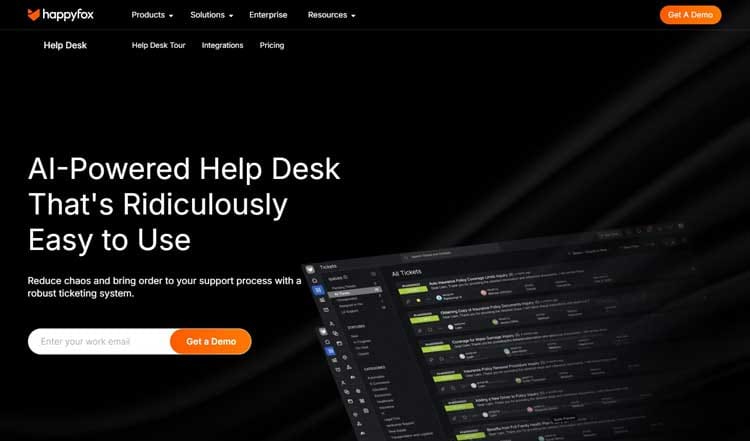
HappyFox combines comprehensive ticketing with advanced automation, self-service knowledge base, and community forums. The platform emphasizes workflow automation through “canned actions”—pre-built automation sequences that handle repetitive tasks consistently.
Customer satisfaction measurement is built into the core platform, with automated survey deployment after ticket resolution. The data drives continuous improvement by identifying agent training needs and process bottlenecks.
Key Features:
- Advanced ticketing system with multi-channel support
- Canned actions for workflow automation
- Self-service knowledge base with article suggestions
- Community forums for peer-to-peer support
- Task management for complex multi-step resolutions
- Built-in satisfaction surveys and CSAT tracking
- SLA management and escalation
- Custom reporting and analytics
Pricing:
- Agent-Based Pricing: Basic $24-29/agent/month | Team $49-$69/agent/month | Pro $69-99/agent/month
- Unlimited Agents: Growth plan from $1,999/month
Ideal for: Growing companies with 10-50 support agents, businesses prioritizing automation, and organizations requiring both support tickets and community forums.
Support Candy
Best for: WordPress users needing extensive customization
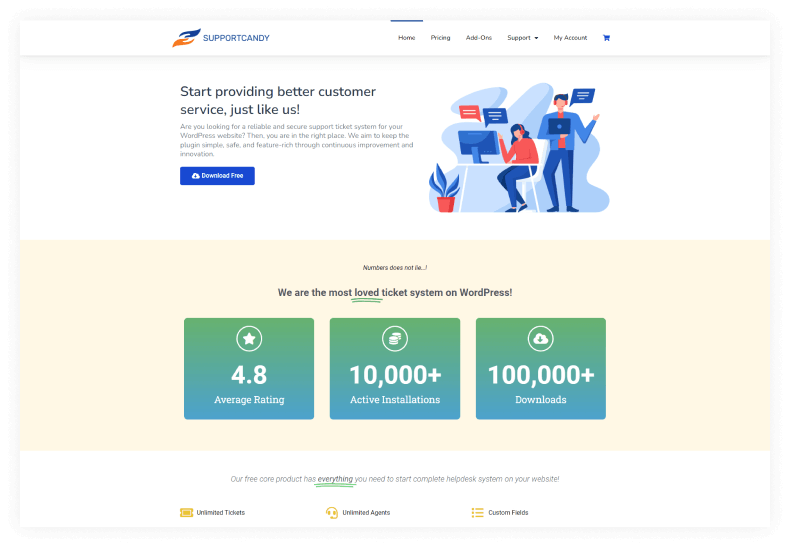
Support Candy has earned its reputation as one of the most feature-rich WordPress ticketing plugins available. With years of continuous development, it offers sophistication rivaling standalone SaaS platforms while maintaining the flexibility of a self-hosted solution.
The plugin provides 16+ custom field types, enabling extensive data collection tailored to specific business needs. Advanced filtering and search let agents quickly locate tickets across thousands of records, while saved filter presets accelerate common workflows.
Private notes facilitate internal team collaboration without exposing discussions to customers. The system supports configurable working hours, GDPR compliance tools, and Google reCaptcha integration for spam prevention.
Key Features:
- Unlimited tickets and agents across all plans
- 16+ custom field types for extensive data collection
- Advanced custom filter and search functionality
- Saved filter presets for customers and agents
- Private notes for internal agent communication
- Agents can create tickets on customer behalf
- Working hours configuration
- GDPR compliance features with data export/deletion
- Google reCaptcha integration
- Regular updates and active development
Pricing:
- Starter Plan: $59
- Economy Plan: $109
- Standard Plan: $149
Ideal for: WordPress businesses requiring deep customization, companies with complex ticket categorization needs, and businesses prioritizing data privacy compliance.
KB Support
Best for: Budget-conscious businesses starting with ticketing.

KB Support provides essential ticketing functionality completely free, making it perfect for startups and small businesses establishing their first formal support system. Despite being free, it delivers core features many businesses need to manage customer inquiries effectively.
The integrated knowledge base serves dual purposes—customers can self-serve common issues, while agents reference articles during ticket resolution. Sequential ticket numbers provide professional tracking, and email notifications keep all stakeholders informed.
Key Features:
- Unlimited tickets on free plan
- Easy-to-manage submission forms
- Sequential ticket numbering system
- Email notifications for all stakeholders
- Assign tickets to multiple agents
- Agent status tracking (available, busy, offline)
- Integrated knowledge base articles
- Simple WordPress installation
Pricing:
- Free Plan: $0 (core features)
- Premium Plans: Starter $74/year | Professional $102/year | Enterprise $150/year
Ideal for: Startups with limited budgets, very small teams (1-5 agents), businesses testing ticketing systems before committing to paid solutions.
WordPress Advanced Ticket System(WATS)
Best for: Call centers and organizations requiring guest user support

WordPress Advanced Ticket System distinguishes itself by focusing on call center environments and supporting unregistered guest users. The guest user feature enables support for customers who don’t have WordPress accounts—critical for public-facing businesses managing inquiries from prospects and occasional customers.
Ticket creation and updates on behalf of users streamline phone support workflows. Call center agents can create tickets during calls, update them with resolutions, and close them without requiring customer login or email verification.
The admin interface provides preset values for priority, status, type, and product categories, accelerating ticket creation and ensuring consistent categorization across large teams.
Key Features:
- Ticket submission through admin for registered users
- Guest user support for unregistered customers
- Create and update tickets on behalf of users
- Preset priority, status, type, and product values
- Customizable ticket properties and keys
- Call center-optimized workflows
- Simple installation without technical knowledge
Pricing:
- Free Version: Available with basic features
- Premium Version: €50/year
Ideal for: Call centers, businesses supporting non-registered users, companies with high phone support volume, and organizations requiring agent-created tickets.
WooCommerce Support Ticket System
Best for: WooCommerce store owners integrating order support
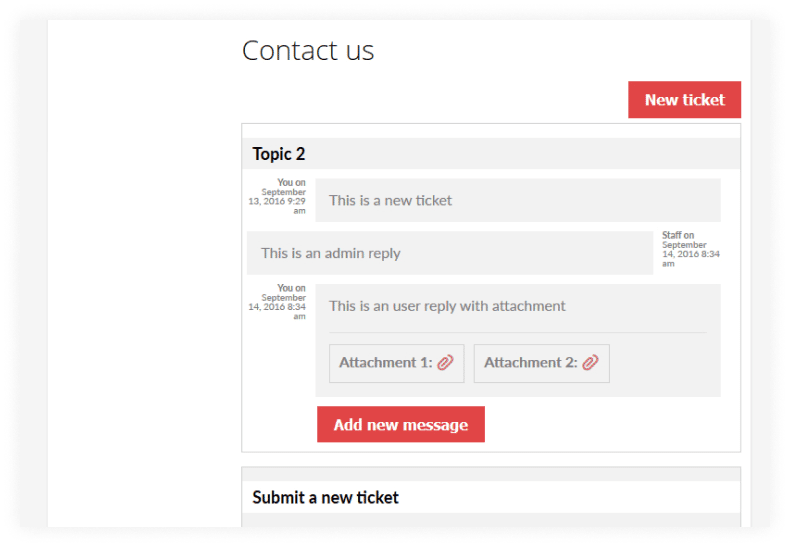
The WooCommerce Support Ticket System provides deep integration with WooCommerce stores, automatically linking tickets to specific orders, products, and customers. This context dramatically accelerates resolution of commerce-related inquiries about shipping, refunds, product issues, and order status.
Customers can submit tickets directly from their account pages or product pages, with order information automatically attached. The threaded message format maintains conversation context, while large file support enables customers to upload photos of damaged products or other documentation.
For store owners exploring multiple options, compare this with other WooCommerce support ticket systems available.
Key Features:
- Deep WooCommerce integration with order linking
- Customer ticket submission via frontend pages
- Message threading for conversation continuity
- Email notifications for all parties
- Ticket management and agent collaboration
- Large file upload support
- WPML compatibility for multilingual support
- Custom text configuration
Pricing:
- Free Version: Available
- Premium Version: $59/year
Ideal for: WooCommerce store owners, e-commerce businesses, and product sellers requiring order context in support tickets.
Help Scout
Best for: Customer-centric teams prioritizing experience over complexity
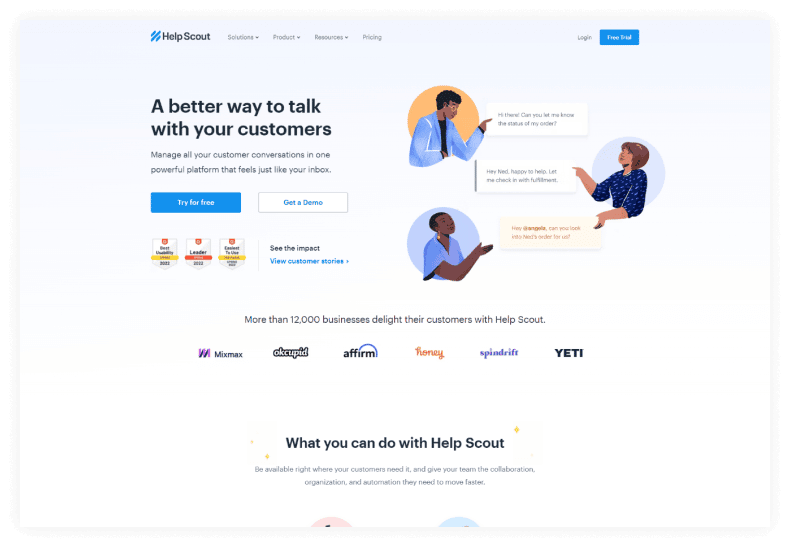
Help Scout has built its reputation on simplicity and user experience. The platform feels more like email than traditional ticketing software, reducing training time and agent resistance to adoption.
The shared inbox consolidates all customer communications while maintaining individual accountability through assignment. The knowledge base editor makes article creation intuitive, with built-in SEO optimization and performance tracking showing which content drives self-service success.
Workflows automate common scenarios without complex rule builders, while reporting focuses on customer-centric metrics like satisfaction scores and response quality rather than just volume metrics.
Key Features:
- Shared inbox with email-like interface
- Knowledge base with user-friendly editor
- Comprehensive customer management profiles
- Native live chat integration
- Customer-focused reporting and analytics
- Visual workflow automation
- Collision detection to prevent duplicate replies
- Mobile apps for iOS and Android
Pricing:
- Starting at $20/user per month (Standard plan)
- Higher tiers available with advanced features
Ideal for: Growing teams (5-50 agents) prioritizing customer experience, companies transitioning from email to ticketing, businesses valuing simplicity over feature complexity.
Zendesk
Best for: Enterprise organizations requiring comprehensive omnichannel support

Zendesk dominates the enterprise ticketing market with comprehensive features, extensive integrations, and proven scalability supporting organizations managing millions of tickets annually.
The Suite plans bundle ticketing, chat, knowledge base, voice, and reporting into unified platforms. AI-powered features include automatic ticket categorization, sentiment analysis, intent detection, and suggested responses based on historical resolutions.
Zendesk’s marketplace offers 1,200+ integrations covering CRM, e-commerce, marketing automation, analytics, and industry-specific applications. The platform supports complex multi-brand configurations, advanced routing, and custom agent roles.
Key Features:
- Enterprise-grade omnichannel ticketing
- AI-powered automation and suggestions
- Comprehensive knowledge base (Zendesk Guide)
- Native voice support with call center features
- Advanced analytics and reporting (Zendesk Explore)
- Extensive integration marketplace
- Multi-brand support for complex organizations
- Developer API for custom integrations
Pricing:
- Starting at $19/agent per month (Support Team – annual billing)
- Suite plans start at $55/agent per month (omnichannel support)
- Enterprise plans available with custom pricing
Ideal for: Large enterprises, companies with complex multi-brand requirements, organizations requiring deep customization and integration capabilities.
Freshservice
Best for: IT departments and companies implementing ITSM practices
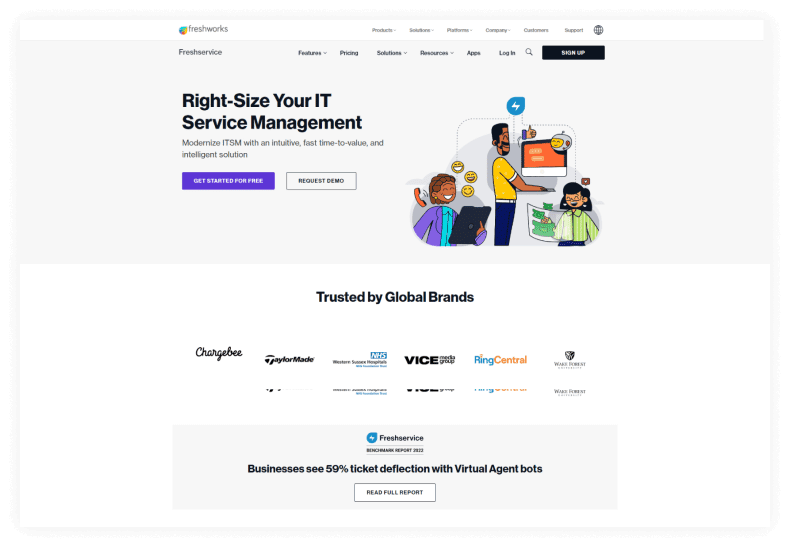
While most ticketing systems focus on customer support, Freshservice specializes in IT service management (ITSM). The platform brings enterprise ITSM capabilities to organizations of all sizes without the complexity and cost of traditional ITSM solutions.
Asset management tracks hardware, software licenses, and contracts, linking support tickets to specific assets. The service catalog provides standardized request fulfillment for common IT requests (laptop setup, software access, password resets).
SaaS management discovers and tracks cloud application usage, identifying unused licenses and shadow IT. Project management features handle complex initiatives requiring cross-functional collaboration.
Key Features:
- Complete ITSM platform with ITIL alignment
- Incident and problem management
- Unified service catalog for standardized requests
- IT asset management with automatic discovery
- SaaS management and optimization
- Change management workflows
- No-code automation and workflow builder
- Integrated project management
Pricing:
- Starter: $19/agent per month
- Growth: $49/agent per month
- Pro: $89/agent per month
- Enterprise: $109/agent per month
Ideal for: IT departments, companies implementing ITIL practices, organizations requiring asset management alongside ticketing, businesses consolidating ITSM tools.
Live Agent
Best for: High-volume support teams requiring unified communications.
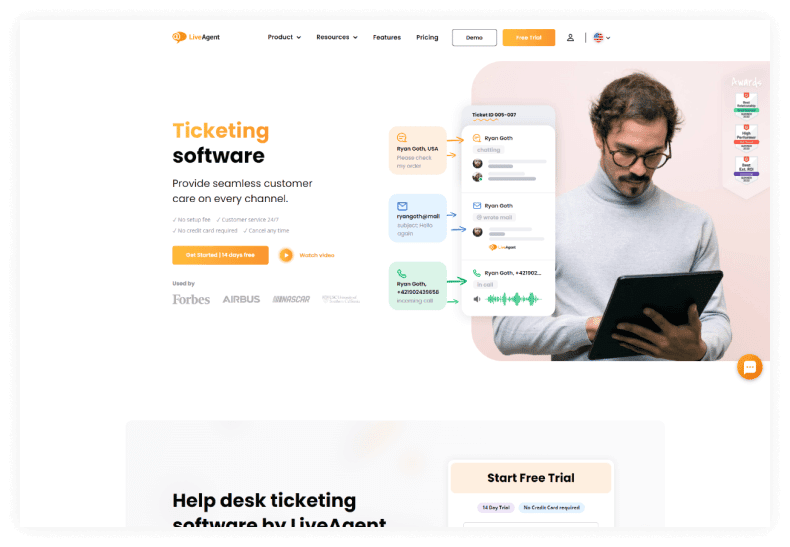
LiveAgent positions itself as the most feature-rich ticketing system available, earning recognition for its comprehensive feature set spanning ticketing, live chat, call center, and social media management.

Every communication channel converts to unified tickets, creating single panes of glass for agent productivity. The universal inbox aggregates emails, chats, calls, social media messages, and contact form submissions into one prioritized queue.
Agent collision detection prevents duplicate responses when multiple agents access the same ticket. Built-in call recording, IVR, and call routing transform LiveAgent into a complete contact center platform.
Key Features:
- Universal inbox for all communication channels
- Native live chat with proactive chat invitations
- Built-in call center with VoIP support
- Agent collision detection
- Agent ranking and gamification
- Automated ticket distribution with intelligent routing
- Canned message library
- Contact form gallery with templates
- Email forwarding and automation
Pricing:
- Free: $0/agent per month (limited features)
- Ticket: $15/agent per month
- Ticket + Chat: $29/agent per month
- All-Inclusive: $49/agent per month
Ideal for: High-volume support teams, companies consolidating multiple support tools, contact centers requiring voice integration, businesses prioritizing value and feature breadth.
Comparison Table
| Tools | Best For | Starting Price | Free Plan | Key Differentiator |
| Support Genix | WordPress/WooCommerce | $59/year | Yes | AI features, WooCommerce integration, lifetime pricing |
| HappyFox | Mid-sized businesses | $24/agent/month | No | Canned actions automation |
| Support Candy | WordPress customization | $59 | No | 16+ custom field types |
| KB Support | Budget-conscious startups | Free | Yes | Free with essential features |
| WATS | Call centers | €50/year | Yes (basic) | Guest user support |
| WooCommerce Tickets | E-commerce stores | Free | Yes | Order integration |
| Help Scout | Customer experience focus | $20/user/month | No | Email-like simplicity |
| Zendesk | Enterprise organizations | $19/agent/month | Yes (trial) | Comprehensive features, scale |
| Freshservice | IT departments | $19/agent/month | Yes (trial) | ITSM and asset management |
| LiveAgent | High-volume teams | $15/agent/month | Yes | Universal inbox, call center |
How to Choose the Right Ticketing System for Your Business
Selecting from dozens of available ticketing systems can feel overwhelming. Use this framework to identify the solution that best matches your specific needs:
1. Assess Your Support Volume and Growth Trajectory
Current ticket volume determines the sophistication you need today. Businesses handling fewer than 50 tickets monthly may thrive with simple solutions like KB Support, while organizations managing 500+ daily tickets require enterprise platforms with advanced routing and automation.
Consider growth projections. If you anticipate doubling support volume within 12 months, prioritize systems that scale without requiring migration. Evaluate whether pricing models remain affordable as you add agents and increase ticket volume.
2. Identify Your Primary Communication Channels
Match system capabilities to how customers actually contact you. If 80% of inquiries arrive via email, prioritize excellent email handling over extensive social media integration.
Omnichannel support becomes critical when customers use multiple channels interchangeably—starting conversations via chat, following up by email, and calling for urgent issues. Systems that unify these touchpoints under single ticket threads provide superior customer experiences.
3. Evaluate Technical Requirements and Existing Infrastructure
WordPress users benefit significantly from native WordPress plugins like Support Genix or Support Candy, avoiding integration challenges and benefiting from familiar interfaces. For those comparing options, review our analysis of WordPress ticket system plugins and features to look for in WordPress support ticket plugins.
Companies using specific CRM systems (Salesforce, HubSpot, Microsoft Dynamics) should verify native integrations exist, as custom integration development is expensive and time-consuming.
Determine whether you prefer cloud-hosted SaaS solutions (no IT infrastructure required) or self-hosted options providing greater control and data privacy but requiring technical resources.
4. Consider the Budget and Total Cost of Ownership
Look beyond advertised per-agent pricing. Calculate the total cost of ownership, including:
- Base subscription costs
- Per-agent charges at expected team size
- Add-on costs for essential features (reporting, automation, integrations)
- Set-up and customization expenses
- Training and ongoing administration time
- Potential integration development costs
Some systems offer flat-rate unlimited agent pricing (HappyFox unlimited plans) that become cost-effective for larger teams. Others provide lifetime licenses (Support Genix), eliminating recurring costs.
5. Prioritize Must-Have Features vs. Nice-to-Haves
Create a feature requirements list in three tiers:
- Must-have: Features your business absolutely cannot operate without
- Important: Capabilities that significantly improve operations but aren’t blocking issues
- Nice-to-have: Features that add convenience or optimization
Focus evaluation on systems meeting 100% of must-haves and the most important features. Don’t pay for extensive, nice-to-have features you’ll never use.
6. Test with Free Trials and Pilot Programs
Most reputable vendors offer free trials (14-30 days). Use this time to:
- Import sample tickets representing real scenarios
- Configure workflows matching your processes
- Train 2-3 team members and gather feedback
- Test mobile access and on-the-go responsiveness
- Evaluate report quality and actionable insights
- Assess customer-facing portals and self-service experience
Pilot with real tickets if possible rather than just demos. Nothing reveals system limitations like actual operational use.
7. Evaluate Vendor Stability, Support, and Roadmap
Research vendor reputation, financial stability, and customer satisfaction. Systems require long-term commitment—vendor viability matters.
Assess the quality of vendor support. If you encounter issues, how quickly and effectively will they help? Review support documentation, community forums, and available support channels.
Review the product roadmap. Is the vendor actively developing new features aligned with industry trends (AI, mobile, integrations)? Stagnant products become liabilities as customer expectations evolve.
Frequently Asked Questions
What is the difference between help desk software and ticketing systems?
The terms are often used interchangeably. Ticketing systems specifically focus on converting inquiries into trackable tickets. Help desk software is broader, potentially including knowledge bases, asset management, and service catalogs alongside ticketing. Most modern platforms blend both capabilities.
Can small businesses benefit from ticketing systems, or are they only for large companies?
Small businesses often benefit more than large enterprises. Without ticketing systems, small teams frequently lose track of customer inquiries, respond inconsistently, and lack performance visibility. Free and affordable solutions like KB Support ($0) and Support Genix ($59/year) make professional ticketing accessible to businesses of any size. Understanding the benefits of good customer service helps small businesses see the ROI of proper ticketing infrastructure.
How long does it typically take to implement a ticketing system?
Implementation timelines vary significantly:
Simple systems: WordPress plugins like Support Genix can be operational in 1-2 hours
Mid-level systems: SaaS platforms like Help Scout typically require 1-2 days for configuration and basic customization
Enterprise systems: Zendesk or Freshservice with extensive customization may require 2-4 weeks including data migration, workflow configuration, and training
Do ticketing systems integrate with CRM platforms like Salesforce or HubSpot?
Most established ticketing systems offer native integrations or API connections with major CRM platforms. Zendesk, HappyFox, Help Scout, and Freshservice all provide Salesforce and HubSpot integrations. WordPress-based solutions like Support Genix support webhook integrations for custom connections. Always verify the availability of specific integrations during evaluation.
Can ticketing systems handle multilingual support?
Many systems support multilingual capabilities, including:
1. Multi-language agent interfaces.
2. Customer-facing portals in multiple languages
3. Automatic translation of ticket content
4. Language-based ticket routing to appropriate agents.
WooCommerce Support Ticket System explicitly supports WPML for multilingual WordPress sites. Enterprise platforms like Zendesk provide comprehensive localization across 40+ languages.
What metrics should I track to measure ticketing system success?
Key performance indicators include:
1. First Response Time: How quickly agents send initial responses
2. Average Resolution Time: How long tickets remain open before resolution
3. Customer Satisfaction Score (CSAT): Post-resolution survey ratings
4. First Contact Resolution Rate: Percentage resolved without follow-ups
5. Ticket Volume Trends: Identifying increasing issues requiring product/process fixes
6. Self-Service Success Rate: Customers resolving issues via knowledge base without creating tickets
7. Agent Productivity: Tickets resolved per agent per day
8. SLA Compliance Rate: Percentage of tickets resolved within SLA commitments
Learn more about why customer satisfaction is important to prioritize these metrics effectively.
Support Genix
WordPress Support Ticket Plugin
Take Your Customer Support to The Next Level and Boost Customer Satisfaction Rates
Conclusion
Support ticketing systems have evolved from simple inquiry tracking tools into comprehensive platforms that transform customer support operations. The right system centralizes communications, automates repetitive tasks, empowers self-service, and provides actionable insights that continuously improve customer experiences.
Choosing the optimal ticketing system requires an honest assessment of your current needs, anticipated growth, technical environment, and budget constraints.
Start with clear requirements, test thoroughly through free trials, and prioritize systems that your team will actually adopt and use consistently. The most feature-rich platform is of no value if its complexity prevents effective use.
As customer expectations continue to rise, the distinction between businesses that provide exceptional support and those that offer frustrating experiences increasingly depends on the infrastructure supporting support teams.
A well-implemented ticketing system isn’t optional—it’s essential infrastructure for any business serious about customer satisfaction, retention, and long-term growth.
Learning how to respond to customer feedback effectively becomes easier with the right ticketing infrastructure in place.
Ready to transform your customer support? Evaluate the systems in this guide, starting with free trials or affordable entry-level plans.
For WordPress users specifically, you can customize your WordPress support ticket plugin to match your exact requirements.